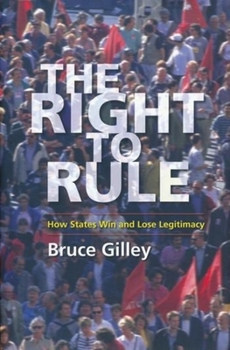The Right to Rule: How States Win and Lose Legitimacy
Popular perceptions of a state's legitimacy are inextricably bound to its ability to rule. Vast military and material reserves cannot counter the power of a citizen's belief, and the more widespread the crisis of a state's legitimacy, the greater the threat to its stability. Even such established democracies as France and India are losing their moral claims over society, while such highly illiberal states as China and Iran enjoy strong showings of public support.
Through a remarkable fusion of empirical research and theory, Bruce Gilley makes clear the link between political consent and political rule. Fixing a definition of legitimacy that is both general and particular, he is able to study the role of legitimacy as it has been maintained and lost in a diverse selection of societies. He begins by detailing the origins of state legitimacy and the methods governments have used to wield it best. He then considers the habits of less successful states, exploring how the process works across different styles of government. Gilley's unique approach merges a broad study of legitimacy and performance in seventy-two states with a detailed empirical analysis of the mechanisms of legitimation. The results are tested on a case study of Uganda, a country that, after 1986, began to recover from decades of civil war. Considering a range of explanations of other domestic and international phenomena as well, Gilley ultimately argues that, because of its evident real-world importance, legitimacy should occupy a central place in political analysis.Format:Hardcover
Language:English
ISBN:0231138725
ISBN13:9780231138727
Release Date:March 2009
Publisher:Columbia University Press
Length:336 Pages
Weight:1.25 lbs.
Dimensions:1.3" x 6.0" x 9.1"
Grade Range:Postsecondary and higher
Customer Reviews
0 rating





